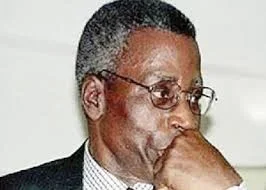How Police Allowed Bola Ige’s Killers Escape – Keyamo
Lagos lawyer, Festus Keyamo, has accused the police of allowing the killers of late Minister of Justice, Bola Ige, escape justice.

He claimed that the mystery behind the assassination was not resolved, because “it’s the case of the killer looking for the killer”.
Ige was murdered by unknown men on December 23, 2001 in his Ibadan home.
Speaking during a symposium held by the Bola Ige Centre for Justice to commemorate 15 years of Ige’s death, with the theme, “Political killings and our criminal justice system: the impediments”, he said Ige’s death showed the failure of Nigeria’s criminal justice system.
He said: “The state was complicit in Bola Ige’s murder. Eight days before his death, he was assaulted at the palace of the Ooni of Ife. Immediately that happened, a red flag should have gone up. When a Minister of Justice was publicly assaulted, the government should have beefed up security around him.
“Aside from this, the police were more interested in destroying the evidence at their disposal. They were struggling to redirect the focus of the investigation. Bola Ige was not killed by armed robbers.
“When they brought me to Alagbon Close in preparation to charge me with arson, because I was representing a group that burnt the NNPC building down, I met Andrew Olofu the principal witness in the same cell with… the prime suspect.
“I told them the investigation had been destroyed because the prime suspect was in the same cell with the principal witness.
“Later, the same Olofu came to court to say that he could not recognise anybody (the suspects) again. That was where the prosecution collapsed. The case of Bola Ige is the case of the killers looking for the killers; that is why it could not be resolved.
“We need answers from the police on the whereabouts of the police officers who went to eat when the late Ige was killed? We need to find out what happened to those orderlies. They should be dismissed for negligence.”

He claimed that the mystery behind the assassination was not resolved, because “it’s the case of the killer looking for the killer”.
Ige was murdered by unknown men on December 23, 2001 in his Ibadan home.
Speaking during a symposium held by the Bola Ige Centre for Justice to commemorate 15 years of Ige’s death, with the theme, “Political killings and our criminal justice system: the impediments”, he said Ige’s death showed the failure of Nigeria’s criminal justice system.
He said: “The state was complicit in Bola Ige’s murder. Eight days before his death, he was assaulted at the palace of the Ooni of Ife. Immediately that happened, a red flag should have gone up. When a Minister of Justice was publicly assaulted, the government should have beefed up security around him.
“Aside from this, the police were more interested in destroying the evidence at their disposal. They were struggling to redirect the focus of the investigation. Bola Ige was not killed by armed robbers.
“When they brought me to Alagbon Close in preparation to charge me with arson, because I was representing a group that burnt the NNPC building down, I met Andrew Olofu the principal witness in the same cell with… the prime suspect.
“I told them the investigation had been destroyed because the prime suspect was in the same cell with the principal witness.
“Later, the same Olofu came to court to say that he could not recognise anybody (the suspects) again. That was where the prosecution collapsed. The case of Bola Ige is the case of the killers looking for the killers; that is why it could not be resolved.
“We need answers from the police on the whereabouts of the police officers who went to eat when the late Ige was killed? We need to find out what happened to those orderlies. They should be dismissed for negligence.”









No comments